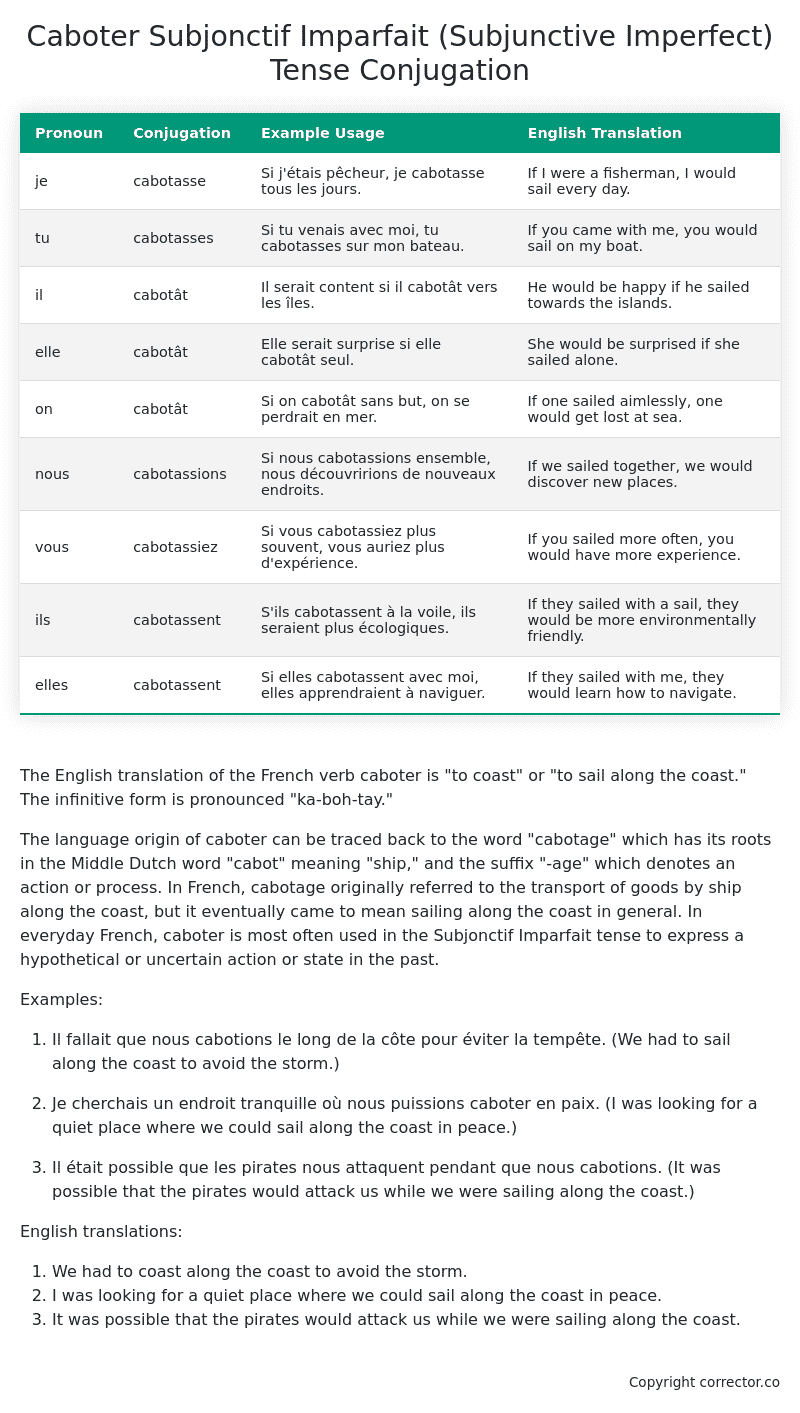Subjonctif Imparfait (Subjunctive Imperfect) Tense Conjugation of the French Verb caboter
Introduction to the verb caboter
The English translation of the French verb caboter is “to coast” or “to sail along the coast.” The infinitive form is pronounced “ka-boh-tay.”
The language origin of caboter can be traced back to the word “cabotage” which has its roots in the Middle Dutch word “cabot” meaning “ship,” and the suffix “-age” which denotes an action or process. In French, cabotage originally referred to the transport of goods by ship along the coast, but it eventually came to mean sailing along the coast in general. In everyday French, caboter is most often used in the Subjonctif Imparfait tense to express a hypothetical or uncertain action or state in the past.
Examples:
-
Il fallait que nous cabotions le long de la côte pour éviter la tempête. (We had to sail along the coast to avoid the storm.)
-
Je cherchais un endroit tranquille où nous puissions caboter en paix. (I was looking for a quiet place where we could sail along the coast in peace.)
-
Il était possible que les pirates nous attaquent pendant que nous cabotions. (It was possible that the pirates would attack us while we were sailing along the coast.)
English translations:
- We had to coast along the coast to avoid the storm.
- I was looking for a quiet place where we could sail along the coast in peace.
- It was possible that the pirates would attack us while we were sailing along the coast.
Table of the Subjonctif Imparfait (Subjunctive Imperfect) Tense Conjugation of caboter
| Pronoun | Conjugation | Example Usage | English Translation |
|---|---|---|---|
| je | cabotasse | Si j’étais pêcheur, je cabotasse tous les jours. | If I were a fisherman, I would sail every day. |
| tu | cabotasses | Si tu venais avec moi, tu cabotasses sur mon bateau. | If you came with me, you would sail on my boat. |
| il | cabotât | Il serait content si il cabotât vers les îles. | He would be happy if he sailed towards the islands. |
| elle | cabotât | Elle serait surprise si elle cabotât seul. | She would be surprised if she sailed alone. |
| on | cabotât | Si on cabotât sans but, on se perdrait en mer. | If one sailed aimlessly, one would get lost at sea. |
| nous | cabotassions | Si nous cabotassions ensemble, nous découvririons de nouveaux endroits. | If we sailed together, we would discover new places. |
| vous | cabotassiez | Si vous cabotassiez plus souvent, vous auriez plus d’expérience. | If you sailed more often, you would have more experience. |
| ils | cabotassent | S’ils cabotassent à la voile, ils seraient plus écologiques. | If they sailed with a sail, they would be more environmentally friendly. |
| elles | cabotassent | Si elles cabotassent avec moi, elles apprendraient à naviguer. | If they sailed with me, they would learn how to navigate. |
Other Conjugations for Caboter.
Le Present (Present Tense) Conjugation of the French Verb caboter
Imparfait (Imperfect) Tense Conjugation of the French Verb caboter
Passé Simple (Simple Past) Tense Conjugation of the French Verb caboter
Passé Composé (Present Perfect) Tense Conjugation of the French Verb caboter
Futur Simple (Simple Future) Tense Conjugation of the French Verb caboter
Futur Proche (Near Future) Tense Conjugation of the French Verb caboter
Plus-que-parfait (Pluperfect) Tense Conjugation of the French Verb caboter
Passé Antérieur (Past Anterior) Tense Conjugation of the French Verb caboter
Futur Antérieur (Future Anterior) Tense Conjugation of the French Verb caboter
Subjonctif Présent (Subjunctive Present) Tense Conjugation of the French Verb caboter
Subjonctif Passé (Subjunctive Past) Tense Conjugation of the French Verb caboter
Subjonctif Imparfait (Subjunctive Imperfect) Tense Conjugation of the French Verb caboter (this article)
Subjonctif Plus-que-parfait (Subjunctive Pluperfect) Tense Conjugation of the French Verb caboter
Conditionnel Présent (Conditional Present) Tense Conjugation of the French Verb caboter
Conditionnel Passé (Conditional Past) Tense Conjugation of the French Verb caboter
L’impératif Présent (Imperative Present) Tense Conjugation of the French Verb caboter
L’infinitif Présent (Infinitive Present) Tense Conjugation of the French Verb caboter
Struggling with French verbs or the language in general? Why not use our free French Grammar Checker – no registration required!
Get a FREE Download Study Sheet of this Conjugation 🔥
Simply right click the image below, click “save image” and get your free reference for the caboter Subjonctif Imparfait tense conjugation!

Caboter – About the French Subjonctif Imparfait (Subjunctive Imperfect) Tense
Formation
Common Everyday Usage Patterns
Interactions with Other Tenses
Subjonctif Présent
Indicatif Passé Composé
Conditional
Conditional Perfect
Summary
I hope you enjoyed this article on the verb caboter. Still in a learning mood? Check out another TOTALLY random French verb conjugation!


